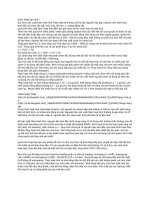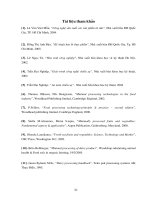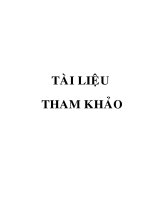tham khao
Bạn đang xem bản rút gọn của tài liệu. Xem và tải ngay bản đầy đủ của tài liệu tại đây (1.68 MB, 17 trang )
<span class='text_page_counter'>(1)</span><div class='page_container' data-page=1>
<b>PERIOD 6</b>
<b>LANGUAGE FOCUS</b>
<b>REVISION</b>
*
<b>THE PRESENT PERFECT *</b>
</div>
<span class='text_page_counter'>(2)</span><div class='page_container' data-page=2>
<b>Adverbs used with</b>
<b> the present perfect</b>
<b>since</b>
<b>for</b>
<b>recently</b>
<b>already</b>
<b><sub>ever</sub></b>
<b>yet</b>
<b>HAVE / HAS + PP</b>
<b> Wednesday, september 29</b>
<b>th</b><b><sub> 2010</sub></b>
<b> PERIOD 6</b>
<b> LANGUAGE FOCUS</b>
<b>* GRAMMAR:</b>
The present perfect tense
</div>
<span class='text_page_counter'>(3)</span><div class='page_container' data-page=3>
<b>*Practice the dialogue:</b>
<b>Nga: Come and see my photo album.</b>
<b>Nam</b>
<b>: Lovely! Who’s this girl?</b>
<b>Nga: Ah! It’s </b>
<b>Lan</b>
<b>, my </b>
<b>old friend.</b>
<b>Nam</b>
<b>: How long have you made friend with her?</b>
<b>Nga: I’ve made friend with her for </b>
<b>six years.</b>
<b>Nam</b>
<b>: Have you seen her recently?</b>
<b>Nga: No, I haven’t seen her since</b>
<b> 2003.</b>
<b> </b>
<b>Quang – brother’s friend / seven months /January</b>
<b>Hoa – new friend / three weeks / Monday</b>
<b>Nam</b>
</div>
<span class='text_page_counter'>(4)</span><div class='page_container' data-page=4>
<b>Have you visited Ben Thanh Market yet?</b>
<b>* Yes, I have already visited it.</b>
</div>
<span class='text_page_counter'>(5)</span><div class='page_container' data-page=5>
<b>Nha Rong Harbor</b>
- Have you ever visited Nha Rong Harbor?
</div>
<span class='text_page_counter'>(6)</span><div class='page_container' data-page=6>
<b>Independence palace</b>
</div>
<span class='text_page_counter'>(7)</span><div class='page_container' data-page=7>
<b>Dam Sen Park</b>
</div>
<span class='text_page_counter'>(8)</span><div class='page_container' data-page=8>
<b>haven’t--* Mapped dialogue</b>
<b> :</b>
-
<b>Have / ever / gone / Hue? </b>
<b> - Yes / have.</b>
-
<b><sub> When / did / last / Hue?</sub></b>
<b> - Last year.</b>
<b>Nam</b>
<b>Nga</b>
<b>Nam: Have you ever</b>
<b> gone to Hue? </b>
<b>Nga: Yes, I have</b>
<b>Nam: When did </b>
</div>
<span class='text_page_counter'>(9)</span><div class='page_container' data-page=9>
<b>Durians</b>
- Have you ever eaten Durian?
</div>
<span class='text_page_counter'>(10)</span><div class='page_container' data-page=10>
<b>Computer</b>
</div>
<span class='text_page_counter'>(11)</span><div class='page_container' data-page=11>
- Have you ever ………?
</div>
<span class='text_page_counter'>(12)</span><div class='page_container' data-page=12></div>
<span class='text_page_counter'>(13)</span><div class='page_container' data-page=13>
<b>2</b>
.
<b>The passive voice in present</b>
:
<b>3. The passive form of modal Verbs, Have to, Be </b>
<b>going to:</b>
<b>Ex: This exercise must be done carefully.</b>
<b> Am / is / are + PP</b>
<b>Must/ can /have to / be going to… + Be + PP</b>
<b>Ex: Jeans are sold all over the world.</b>
<b>Form:</b>
</div>
<span class='text_page_counter'>(14)</span><div class='page_container' data-page=14>
<b>1</b>
<b>11</b>
<b>3</b>
<b>12</b>
<b>6</b>
<b>10</b>
<b>7</b>
<b>8</b>
<b>9</b>
<b>2</b>
<b>4</b>
<b>5</b>
</div>
<span class='text_page_counter'>(15)</span><div class='page_container' data-page=15>
<b>* Change these sentences into the passive voice, as directed:</b>
<b>a. They made jean cloth completely from cotton in the 18th<sub> century.</sub></b>
<b>- Jean cloth</b>
<b>b. They grow rice in tropical countries.</b>
<b>- Rice</b>
<b>c. They will produce a lot of rice in Vietnam next year.</b>
<b>- A lot of rice</b>
<b>d. They have just introduced a new style of jeans in the USA</b>
<b>- A new style of jeans</b>
<b>e. We can solve the problem.</b>
<b>- The problem </b>
<b>f. We have to improve all the schools in the city.</b>
<b>- All the schools in the city </b>
<b>g. They are going to build a new bridge.</b>
<b>- A new bridge </b>
was made from cotton in the 18
thcentury
is grown in tropical country
will be produced in Viet Nam next year.
has just been introduced in the USA
can be solved by us.
</div>
<span class='text_page_counter'>(16)</span><div class='page_container' data-page=16>
<b>II. Homework: </b>
<b>1. Use the correct form of the verbs:</b>
a. I (learn) English for 4 years.
b. They (live) in Danang since 2001
c. You (eat) Chinese food yet?
d.Two department stores (build) next year.
2.
<b>Prepare unit 3 – Getting started – Listen &</b>
</div>
<span class='text_page_counter'>(17)</span><div class='page_container' data-page=17></div>
<!--links-->









